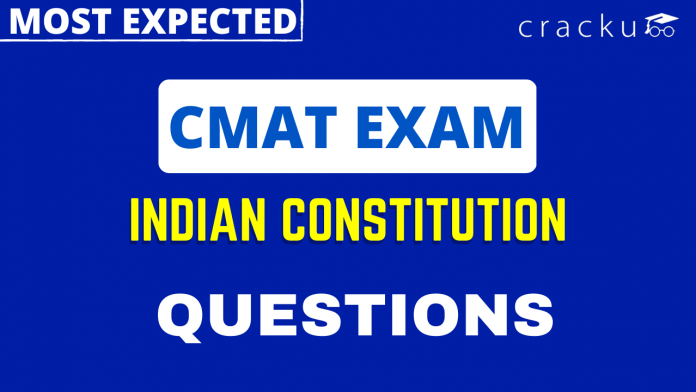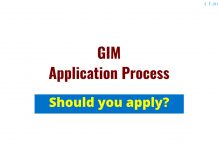Indian Constitution Questions for CMAT
Indian Constitution is one of the most important sections in the CMAT, and also it is a scoring section. One can utilize this article which consists of the most important GK questions regarding the Indian Constitution. Cracku provides you with the Top 20 very Important Indian Constitution Questions for CMAT based on the questions asked in previous exam papers. Click on the link below to download the Indian Constitution Questions for CMAT PDF with detailed answers.
Download Indian Constitution Questions for CMAT
Enroll to CMAT 2023 Crash Course
Question 1: Given below are two statements:
Statement I : Indian Constitution uses the word ‘minority’ to mean ‘any sections of citizens’ having a distinct language, script or culture.
Statement II : This may be a whole community living within a majority community.
In the light of the above statements, choose the correct answer from the options given below
a) Both Statement I and Statement II are true
b) Both Statement I and Statement II are false
c) Statement I is true but Statement II is false
d) Statement I is false but Statement II is true
1) Answer (A)
Question 2: Article 356 of the Constitution of India provides for
a) Reservation of the jobs for backward classes
b) Protection of religious monument
c) Imposition of President’s rule in a State
d) Right to Education
2) Answer (C)
Question 3: Which of the following articles deals with “Right to Constitutional Remedies”?
a) Article 32
b) Article 33
c) Article 34
d) Article 35
3) Answer (A)
Solution:
Article 32 deals with “Right to Constitutional Remedies”.
Question 4: The Eighth schedule of the Indian constitution deals with ___?
a) Abolition of Zamindari system
b) Official languages
c) Administration of tribal areas in Assam, Meghalaya, Tripura and Mizoram
d) Name of States and Union Territories
4) Answer (B)
Solution:
The Eighth schedule of the Indian constitution deals with Official languages.
Question 5: Under which article of Indian constitution a constitutional amendment bill can be represented?
a) Article 352
b) Article 360
c) Article 368
d) Article 356
5) Answer (C)
Solution:
Under Article 368 of Indian constitution a constitutional amendment bill can be represented.
Hence, option c is the correct answer.
Question 6: How many fundamental rights (including the ‘Right to property’) were provided by the constitution of India originally to its citizens?
a) 8
b) 7
c) 6
d) 9
6) Answer (B)
Solution:
Seven fundamental rights were provided by the constitution of India originally to its citizens. Later on ‘Right to property’ was removed and right now only six fundamental rights are there.
Hence, option b is the correct answer.
Question 7: Suspension of fundamental rights during emergency was taken in the Indian constitution from the constitution of which of the following countries?
a) French
b) South African
c) British
d) Germany
7) Answer (D)
Solution:
Suspension of fundamental rights during emergency was taken in the Indian constitution from the constitution of Germany.
Hence, option d is the correct answer.
Question 8: Imposition of president’s rule in a state is specified by which of the following articles of the Indian constitution?
a) Article 346
b) Article 353
c) Article 343
d) Article 356
8) Answer (D)
Solution:
Imposition of president’s rule in a state is specified by Article 356.
Question 9: Article 17 of the Indian constitution deals with which of the following?
a) Abolition of untouchability
b) Right to freedom
c) Right to education
d) Equal opportunity in employment
9) Answer (A)
Solution:
Article 17 of the Indian constitution deals with Abolition of untouchability.
Question 10: Which of the following languages is not in the eighth schedule of the Indian constitution?
a) Gujarati
b) Pali
c) Maithili
d) Santhali
10) Answer (B)
Solution:
Pali is not in the eighth schedule of the Indian constitution.
Hence, option b is the correct answer.
Question 11: ‘Financial Emergency’ is mentioned in which of the following articles of Indian constitutions?
a) Article 352
b) Article 370
c) Article 360
d) Article 356
11) Answer (C)
Solution:
‘Financial Emergency’ is mentioned in Article 360 of Indian constitution.
Hence, option c is the correct answer.
Question 12: Which of the following articles of the Indian constitution gives the power to parliament for repealing a law?
a) Article 239
b) Article 298
c) Article 243
d) Article 245
12) Answer (D)
Solution:
Article 245 gives the power to parliament for repealing a law in the Indian constitution.
Hence, option d is the correct answer.
Question 13: Which of the following articles of the Indian constitution gives the power to promulgate ordinances?
a) Article 213
b) Article 123
c) Article 239
d) Article 147
13) Answer (B)
Solution:
Article 123 of the Indian constitution gives the power to promulgate ordinances.
Hence, option b is the correct answer.
Question 14: In the Indian constitution, a feature named ‘Independence of the judiciary’ was taken from which of the following countries’ constitution?
(i) UK
(ii) South Africa
(iii) US
a) (i)
b) (i) and (iii)
c) (ii) and (iii)
d) (iii)
14) Answer (D)
Solution:
In the Indian constitution, a feature named ‘Independence of the judiciary’ was taken from the US constitution.
Hence, option d is the correct answer.
Question 15: What is the maximum seating potential of Rajya Sabha according to the Article 80 of the Indian Constitution .
a) 235
b) 238
c) 245
d) 248
e) 250
15) Answer (E)
Solution:
The maximum seating potential of Rajya Sabha is 250 according to the Article 80 of the Indian Constitution.
Question 16: When is constitution day celebrated in India?
a) 26th January
b) 26th December
c) 26th February
d) 26th November
e) 26th March
16) Answer (D)
Solution:
Constitution Day, also known as “National Law Day”, is celebrated in India on 26th November every year to commemorate the adoption of the Constitution of India.
Question 17: Who among the following has been given the power by the Constitution of India to “Impose Reasonable Restrictions” on the fundamental rights?
a) President
b) Parliament
c) Supreme Court
d) Both Parliament and Supreme Court
17) Answer (B)
Question 18: Article 371A of the Constitution of India provides special privileges to which one of the following state?
a) Nagaland
b) Mizoram
c) Sikkim
d) Manipur
18) Answer (A)
Question 19: The language and ideals of the Preamble of Constitution of India is influenced / borrowed from which of the following constitution(s)?
(A) USA
(B) France
(C) Australia
Choose the correct answer from the options given below:
a) Only (A) & (B)
b) Only (B) & (C)
c) (A), (B) & (C)
d) Only (A) & (C)
19) Answer (C)
Question 20: Which article of Indian constitution defines “state”?
a) Article 18
b) Article 15
c) Article 12
d) Article 29
20) Answer (C)
Question 21: Removal of supreme court and high court judge is a feature borrowed from which country’s constitution?
a) USA
b) Canada
c) Australia
d) Ireland
21) Answer (A)
Question 22: Which constitution amendment act is known as Mini constitution?
a) 22nd
b) 72nd
c) 42nd
d) 44th
22) Answer (C)
Question 23: Who is the calligrapher of the Indian Constitution?
a) Pingali Venjayya
b) Prem Behari Narain Raizada
c) Sarvepalli Radhakrishnan
d) Sarojini Naidu
23) Answer (B)
Question 24: Organization of village Panchayats belongs to which article of Indian constitution?
a) Article 44
b) Article 50
c) Article 51
d) Article 40
24) Answer (D)
Solution:
Article 40 of the Constitution, which enshrines one of the Directive Principles of State Policy, lays down that the State shall take steps to organise village panchayats and endow them with such powers and authority as may be necessary to enable them to function as units of self-government.
Thus, the correct option is D.
Question 25: Principles of Liberty, Equality and Fraternity was absorbed from which country’s constitution?
a) Australia
b) Ireland
c) France
d) Canada
25) Answer (C)
Solution:
The ideals of Liberty, Equality and Fraternity enshrined in the Constitution of India are borrowed from the constitution of France.
Thus, the correct option is C.





